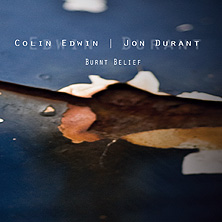 The
12/21/12 CD release of Burnt Belief is a fantastic studio
collaboration between Porcupine Tree bass player Colin Edwin and
Cloud Guitar extrapolator Jon Durant. The results combine for
an instrumental rock album that takes the listener on a deep and meditative
sonic journey. One of the cutting edge electric guitar technicians
at the dawn of 21st century rock , Durant does sound influenced by
late period Robert Fripp style guitarscapes yet, over the course of
nearly ten albums, Jon has developed a unique sound and musical vision
in his own right. While Steven Wilson is busy remixing Jethro Tull
and King Crimson albums with excellent results, Colin Edwin takes
a break from Porcupine Tree for the 2012 Edwin / Durant album and
the results will surely open progressive ears to the influence each
of these artists has made on a cross-section of progressive music
listeners. On Burnt Belief Durant sounds like Fripp and Eno
rolled into one and the added magic of Edwin’s dreamy, pulsating
bass layers makes Burnt Belief one of the most intriguing guitar-based
ambient electronica CD titles of 2013. www.facebook.com/BurntBelief
The
12/21/12 CD release of Burnt Belief is a fantastic studio
collaboration between Porcupine Tree bass player Colin Edwin and
Cloud Guitar extrapolator Jon Durant. The results combine for
an instrumental rock album that takes the listener on a deep and meditative
sonic journey. One of the cutting edge electric guitar technicians
at the dawn of 21st century rock , Durant does sound influenced by
late period Robert Fripp style guitarscapes yet, over the course of
nearly ten albums, Jon has developed a unique sound and musical vision
in his own right. While Steven Wilson is busy remixing Jethro Tull
and King Crimson albums with excellent results, Colin Edwin takes
a break from Porcupine Tree for the 2012 Edwin / Durant album and
the results will surely open progressive ears to the influence each
of these artists has made on a cross-section of progressive music
listeners. On Burnt Belief Durant sounds like Fripp and Eno
rolled into one and the added magic of Edwin’s dreamy, pulsating
bass layers makes Burnt Belief one of the most intriguing guitar-based
ambient electronica CD titles of 2013. www.facebook.com/BurntBelief
mwe3.com presents an interview with
JON DURANT
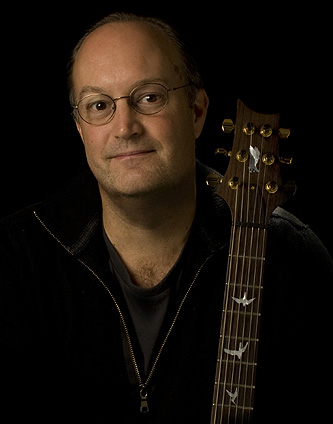 mwe3:
Back in 2011 you released Dance Of The Shadow Planets which
featured contributions from Colin Edwin. How did that lead to you
and Colin working together on the 2013 CD release of Burnt Belief,
which is a joint release between you and Colin. What were the
events that led to Burnt Belief and describe the chemistry
between you and Colin and who else played with you on this new CD?
I heard Geoff Leigh of Henry Cow was on the new album. Can you compare
this new album with Dance Of The Shadow Planets in structure
and sound approach?
mwe3:
Back in 2011 you released Dance Of The Shadow Planets which
featured contributions from Colin Edwin. How did that lead to you
and Colin working together on the 2013 CD release of Burnt Belief,
which is a joint release between you and Colin. What were the
events that led to Burnt Belief and describe the chemistry
between you and Colin and who else played with you on this new CD?
I heard Geoff Leigh of Henry Cow was on the new album. Can you compare
this new album with Dance Of The Shadow Planets in structure
and sound approach?
JON DURANT: The sessions for Dance Of The Shadow Planets
were a really amazing time for all of us. Given that we’d never
worked together before that, and indeed none of the four players knew
each other at all apart from me, it was incredible that the first
track on the CD (“Forbidden Ardor”) was supposed to just
be a warm up when we first set up our gear. There was an immediate
chemistry, partially because everyone had responded to the music in
a positive way, and partially because I really had the players in
mind when I constructed the demos so they really felt comfortable.
On top of that, everyone came in totally prepared with the music.
But a large part was that as people we all really got on well together
and that really, I think, came through in the music.
Because the response to Shadow Planets was so positive, there
was a fair bit of discussion about wanting to do more work together.
At the start of 2012, Colin suggested that I start writing. The first
couple things I came up with felt to me to be too close to Shadow
Planets, and when I said I didn’t want to do “Shadow
Planets, Part 2” he suggested that we try writing together. We
each had a few ideas that were incomplete, or in need of a finishing
touch, plus Colin had the idea of taking my “cloud guitar”
soundscapes, which have no rhythmic foundation, and running them through
a slicer. This provided a rhythm concept from which he would then
build tracks with his bass and drum programming then send off to me
to write melodic content. From there, a little back and forth ensued
and we came up with some very compelling material.
Once the structures were finished, we then added percussionist Jerry
Leake, who’d been such a huge part of Shadow Planets, and
Geoff Leigh, who besides being a founding part of Henry Cow, has worked
extensively with Colin in their Ex-Wise Heads project. We wanted to
add more human elements to offset the electronic nature of the drum
programming and synth melodies. They both played some very exciting
and expressive parts!
mwe3: What was your guitar setup like on Burnt Belief, which
guitars were most featured and what other instruments were used? Also
can you add in something about Colin’s instrument setup?
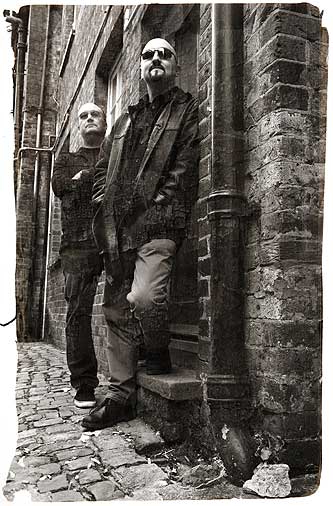 JON
DURANT: The electric guitars used on Burnt Belief are all
Paul Reed Smiths. I have several, and all of them make an appearance
in various places on the record, but the primary one on Burnt Belief
was a 20th Anniversary Custom 22, which has been midi-fied. The rig
is a fairly complex part of all of it. The primary effects are a Lexicon
MPX-1 and a JamMan for the cloud work. I also used a really great
fuzz box, the Dwarfcraft Bit Mangler, on “Balthasar’s Key”
and “The Weight Of Gravity”. I used a Pigtronix Philosopher’s
Tone compressor to get the really sustained leads, and the distortion
(apart from those two songs) is from the amp, a Mesa Boogie Mark V.
JON
DURANT: The electric guitars used on Burnt Belief are all
Paul Reed Smiths. I have several, and all of them make an appearance
in various places on the record, but the primary one on Burnt Belief
was a 20th Anniversary Custom 22, which has been midi-fied. The rig
is a fairly complex part of all of it. The primary effects are a Lexicon
MPX-1 and a JamMan for the cloud work. I also used a really great
fuzz box, the Dwarfcraft Bit Mangler, on “Balthasar’s Key”
and “The Weight Of Gravity”. I used a Pigtronix Philosopher’s
Tone compressor to get the really sustained leads, and the distortion
(apart from those two songs) is from the amp, a Mesa Boogie Mark V.
Most of the pieces on the record feature melodies played on guitar
synth, and the primary sound is a sample of a Turkish Ney. On “Impossible
Senses” the guitar synth was playing mini moog emulation.
There’s also used a fair bit of 12-string, a Takamine. I played
a lot of piano on the record as well. On “Uncoiled” I did
some prepared piano work, where I did things like putting erasers
in between strings to dampen and detune, and a phone on top of the
strings in the upper register, which resulted in a sound similar to
a hammered dulcimer. On “Balthasar’s Key” I played
a rhodes sample, which we ran through an amp simulator to give it
that great crunchy feel.
Colin played a new fretless bass made for him by Spector. He’d
been playing their fretted basses in Porcupine Tree, but had played
his Wal fretless on Shadow Planets. PJ at Spector heard that
and realized that they needed to make a fretless for him, and that
bass makes its debut here on Burnt Belief. He also played some
great upright on “Arcing Towards Morning”.
mwe3: You recorded Dance Of The Shadow Planets in the
same room with the other musicians. What was the recording process
like on Burnt Belief, and where and when was the album written
and recorded, how long did it take to complete and what’s been
the reaction by fans and the press?
JON DURANT: The difference between the two records, at least
in terms of approach, was enormous. Dance Of The Shadow Planets
was “live”, with everyone in the studio tracking together,
and the only overdubs were textural. On Burnt Belief, Colin
and I were each in our own home studios, doing everything separately.
We would take liberties with each other’s original parts, cutting/pasting
to move things around until we’d agreed where they should go.
From there, we redid parts to make them feel live and free, and not
all chopped up. So in the end, the results actually feel fairly similar
between the two records. The writing and recording began in March
of 2012, and we finished mastering in September.
We recorded Jerry’s percussion up at Randy Roos’ Squam Sound
studio in NH, which is where we did all of Shadow Planets.
Randy also did the mixing and mastering, and I think he did an amazing
job. So far the response has been terrific—many great comments
from people about the sound quality.
mwe3: Can you say something about the Burnt Belief title
and the CD cover art? It’s interesting that you released the
album on 12/21/12, which everyone was so scared about! Is that where
the title “Burnt Belief” comes from? Why do you think there
was so much talk this past year about doomsday and are these negative
frightening times good for making music? Where do you see our society
going? It seems with all this access to information we know less now
in a strange way.
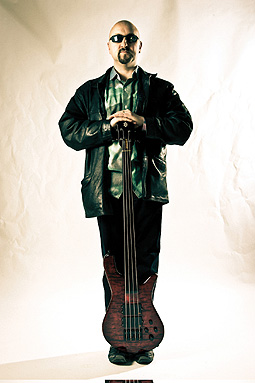 JON
DURANT: Yeah, the title came from Colin’s reading of the
book “When Prophecy Fails” be Leon Festinger. The book is
an inside look at a doomsday cult from 1955 which was infiltrated
by a team sent in by Festinger, a social psychologist working at a
nearby college. Funnily enough, their cataclysmic event was due to
happen on December 21st of that year, and of course didn’t. And
the amazing part was that the most committed of the members dug in
deeper despite the obvious failure of the event to happen.
JON
DURANT: Yeah, the title came from Colin’s reading of the
book “When Prophecy Fails” be Leon Festinger. The book is
an inside look at a doomsday cult from 1955 which was infiltrated
by a team sent in by Festinger, a social psychologist working at a
nearby college. Funnily enough, their cataclysmic event was due to
happen on December 21st of that year, and of course didn’t. And
the amazing part was that the most committed of the members dug in
deeper despite the obvious failure of the event to happen.
We’d both been fascinated by this mindset. As we look around,
it’s rather remarkable that in 2012 (now 2013) we continue to
be plagued by such superstitious thinking at the same time that so
many remarkable things are going on in real life. Things have progressed
so much, but people still have this desperate need to feel somehow
that something is watching over them and that humans are the center
of the universe.
I don’t know that any of this has any direct impact on music
making inherently, but in our case it certainly gave us a direction
to pursue. Which is: we wanted to make music which puts you in a place
where you can think about things, ask yourself the hard questions
about what you believe and why. And, ultimately, whatever you believe
is fine—as long as you’re not trying to tell someone else
what to believe. Or, you know, fly planes into buildings.
My photography on the cover is related to that process. The images
are extreme close-ups of fire hydrants. When you look that closely,
you see things that are very different from the mundane item on the
side of the road that is used to put out fires. There are angles and
curves and decay and life. It’s a fascinating world, and it should
be fully explored!
mwe3: You’ve worked with some great musicians in the past
like Michael Manring and Tony Levin. How would you compare working
with those icons and now with Colin Edwin on the new album? It’s
interesting to note that you were so influenced by the pioneering
U.K. prog-rock icons especially YES and, now with Colin you’re
working with a whole new generation of musicians. Also interesting
is that Colin’s partner in Porcupine Tree, Steven Wilson is currently
making history by actually remixing classic albums from King Crimson
and Jethro Tull. Is this like a large circle of generations of musicians
influencing each other?
JON DURANT: The thing about Colin that’s different from
Michael and Tony is that from day one, Colin felt much more like a
collaborator than a session player. Tony was always great to work
with, and an incredible player, but with Colin there was an immediate
musical rapport that is kind of hard to describe. As he was working
with the demos for Shadow Planets he sent me a note to tell
me how much his wife was enjoying hearing it—something she never
does. It just seems like he and I are very much attuned to each other’s
musical sensibilities.
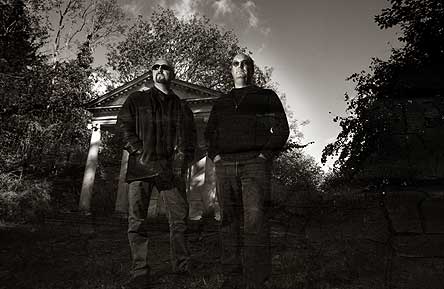 There
is a funny thing about the prog world, which is that for all the amazing
things that happened back in the day, so much of it stopped progressing
after about 1978. There seems to be a bit of a resurgence out there
now, which is good and I hope that it begins to gain wider appeal
again. Steven Wilson’s involvement with Crimson and Tull is absolutely
bridging the gap and bringing the generations together. His Crimson
remixes, especially Lizard and Larks Tongues are absolutely
magical. They really bring out a lot of elements that were inaudible
back in the day and have breathed new life into a couple very important
records in my life.
There
is a funny thing about the prog world, which is that for all the amazing
things that happened back in the day, so much of it stopped progressing
after about 1978. There seems to be a bit of a resurgence out there
now, which is good and I hope that it begins to gain wider appeal
again. Steven Wilson’s involvement with Crimson and Tull is absolutely
bridging the gap and bringing the generations together. His Crimson
remixes, especially Lizard and Larks Tongues are absolutely
magical. They really bring out a lot of elements that were inaudible
back in the day and have breathed new life into a couple very important
records in my life.
mwe3: When did you decide you wanted to work in the music world
and what were your biggest influences when you were younger? I know
you mentioned YES but I hear more of a King Crimson - Fripp / ECM
twist in your music.
JON DURANT: I knew I had to be involved in music at a very
early age. Certainly hearing “Roundabout” was a moment where
I felt an incredible strong connection to the music. One incident
from 6th grade also comes to mind. I was in school and suddenly found
myself engrossed in “Exiles” (by King Crimson). Now this
was long before personal music players, so the music was all in my
head. And I realized I could solo Wetton’s bass, or Bruford’s
drums, or Fripp’s guitar and was having a blast isolating the
guitar part. Meanwhile, the teacher noticed that I was zoning out,
and was yelling at me but I didn’t hear him at all!
The ECM thing began for me about 1978 when I heard Terje Rypdal’s
“Waves”. That record completely leveled me, and to this
day I think it might be the single biggest influence on my playing.
Since then I have acquired many, many titles from ECM, and they have
undoubtedly had a significant impact on me.
mwe3: What musical genres are most important to you when it
comes to writing and recording? Your music contains elements of progressive
rock but also experimental music such as Berio, Carlos and even soundtrack
composers like Morricone. It was always amazing to me just how listenable
even the most avant gard artists can be if the recording is well mastered
and presented! How do you feel about cross-pollinating musical genres
to get the maximum results?
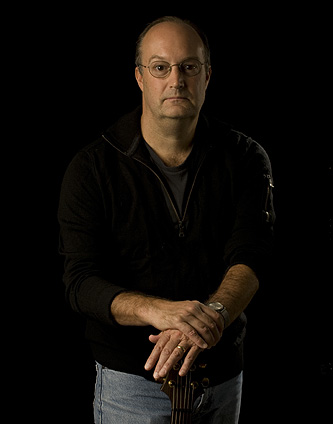 JON
DURANT: The thing about progressive rock that appealed to me in
the first place is that it wasn’t a genre. The idea was that
all these different elements, classical, rock, jazz could all be intermingled
was really exciting to me. And still is. The music I’m most interested
in is not constrained by formats. This is why Peter Gabriel and Robert
Fripp continued to be huge influences on my music into the 1980s and
90s—they explored other musical elements to add to what they
did, and produced some remarkable results. To a lot of people, jazz
is a specific thing, and anything post 1959 isn’t really jazz.
But to me, the most interesting jazz happened when people started
putting other elements into it. Also, a lot of “world music”
to me ends up being very specific to whatever tradition is being represented,
and so ends up being not really worldly, but only looking at one region
or culture. But the really interesting stuff happens when a group
like Oregon took Indian music and fused it with jazz and western classical
music's to create something wholly unique.
JON
DURANT: The thing about progressive rock that appealed to me in
the first place is that it wasn’t a genre. The idea was that
all these different elements, classical, rock, jazz could all be intermingled
was really exciting to me. And still is. The music I’m most interested
in is not constrained by formats. This is why Peter Gabriel and Robert
Fripp continued to be huge influences on my music into the 1980s and
90s—they explored other musical elements to add to what they
did, and produced some remarkable results. To a lot of people, jazz
is a specific thing, and anything post 1959 isn’t really jazz.
But to me, the most interesting jazz happened when people started
putting other elements into it. Also, a lot of “world music”
to me ends up being very specific to whatever tradition is being represented,
and so ends up being not really worldly, but only looking at one region
or culture. But the really interesting stuff happens when a group
like Oregon took Indian music and fused it with jazz and western classical
music's to create something wholly unique.
This is what I try to do. Take elements of everything that I’ve
been inspired by and try to mash it together into something that is
musically interesting. And, ultimately, make it something that I would
want to listen to. My feeling is that if I wouldn’t honestly
want to listen to it, how could I expect anyone else to?
mwe3: What interests do you have outside of the music world?
Even for instrumental music, how much do current events shape your
musical ideas? Speaking of current events and reality influencing
art, have you done a lot of soundtrack work? I saw your video for
the track “Semazen” and it’s excellent. Was there a
message in that video and what about more soundtrack work and videos
from you in the future?
JON DURANT: For the last several years, I have had a great
interest in photography. It’s been great to have an alternative
muse. Because I really want each record to be unique it often takes
a couple years for me to get out of the space of the previous record
and figure out what the next one will be. So while the music goes
quiet, it’s been great to have another creative outlet. And,
it ends up giving me some cover art!
The “Semazen” video was a story about how religion can be
overly controlling and very often keeps women subjugated. In this
case we have a lovely young woman who is lost in her contemplations
in a book about freeing herself, while the world is passing her by.
Eventually she summons the courage to lose the shackles and let her
self go. To me, one of the most horrible things in the world today
is the oppression of women in the name of religion. The story of that
girl in Pakistan who was shot by the Taliban because she spoke out
about how girls should be going to school is just staggering to me.
The world, as a whole, needs to get beyond this mentality.
As for soundtracks: there are some things I’ve done in the past
and would love to do more. There have been a couple things recently
that have been put forth but nothing concrete yet. Hopefully, they
will come to pass.
 mwe3:
How about plans to further promote Burnt Belief, possible live
shows with Colin, and a second album with him, and also future plans
for your record label and regarding writing and recording new music?
mwe3:
How about plans to further promote Burnt Belief, possible live
shows with Colin, and a second album with him, and also future plans
for your record label and regarding writing and recording new music?
JON DURANT: We are very interested in doing some live work,
and a couple things in Europe look like they’ll be happening
this summer. Also, Colin has been producing a project with some singers
from the Ukraine, called Astarta, who make traditional folk music
that they want to bring into a modern context. Colin has done some
fabulous work with that, and I’ve gotten involved in that project
as well. The record should be done by spring. We’re also looking
at possibilities of some US dates as well, so definitely stay tuned.
As for further down the road, there is no question that Colin and
I think of Burnt Belief as a band at this point, so the likelihood
is very high that another record will be coming at some future date.
Thanks to Jon Durant @ www.AlchemyRecords.com



